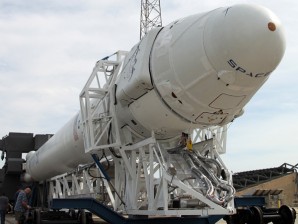WASHINGTON – Elon Musk, the Internet entrepreneur and owner of SpaceX, which aims to be the first private firm to send a cargo craft to the International Space Station, admits he has a case of pre-launch jitters.

In this April 29, 2012 photo provided by SpaceX, a SpaceX Dragon capsule on the company’s Falcon 9 rocket is transported to a launch pad in Cape Canaveral, Fla. Space Exploration Technologies Corp., better known as SpaceX, announced the latest delay Wednesday, May 2, 2012. The company did not set a new launch date. A Falcon rocket carrying a Dragon capsule was supposed to blast off from Cape Canaveral on Monday, May 7, 2012, but additional software testing was ordered. The test flight is already three months late. AP/SpaceX
In an interview with AFP, Musk described the oft-delayed launch of his company’s cargo-loaded Dragon spacecraft – now pushed back to May 19 – as both “exciting” and “extremely difficult,” and expressed confidence in his team.
“It’s just taking longer than expected to analyze all the data,” Musk told AFP by telephone. “We need to make sure that the software is going to make the right commands and not endanger the space station.”
SpaceX made history with its Dragon launch in December 2010, becoming the first commercial outfit to send a spacecraft into orbit and back.
This time, the gumdrop-shaped Dragon capsule will carry 521 kilograms (1,148 pounds) of cargo for the space lab and will also aim to return a 660-kilo load to Earth.
The attempt to send the spacecraft from Cape Canaveral, Florida to the orbiting research lab has been repeatedly delayed, most recently from a planned May 7 launch date, and earlier on April 30.
The latest delay is to ensure that there are no glitches in the craft’s software.
“I usually sleep well before a launch… but no, I’m not sleeping well,” Musk said with a laugh when asked if he was nervous this time around.
The 40-year-old Musk, who was born in South Africa but is now a US citizen, nevertheless said he believed the mission would be a success.
“NASA does feel pretty good about it and we feel pretty good about it,” he said, though cautioning: “You can’t simulate the ISS on the ground.”
Musk, who is also the co-founder of PayPal and Tesla Motors, refused to lay precise odds on Dragon’s success, saying it was “probably more than 50 percent” — and pledging to try again should the launch fail.
“It’s exciting and… it’s an extremely difficult task, and we want it to succeed at the first try,” he said.
The main goals of SpaceX’s cargo flight include a fly-by of the ISS and a berthing operation in which the Dragon will approach the ISS. The crew aboard the orbiting outpost will use its robotic arm to help the Dragon latch on.
Musk, who has invested $100 million of his estimated $2 billion fortune in SpaceX, is clearly proud of how far the firm has come in 10 years despite his lack of space experience, and says he hopes to develop technology to go to Mars.
“I think it is a case where sometimes the little guy wins,” he said, referring to others in the private space race including aerospace giant Boeing.
According to the $1.6 billion contract between SpaceX and NASA, his company has been hired to carry out 12 more missions over four years.
The US space agency also signed a $1.9 billion deal with Orbital Sciences Corp. for eight cargo missions to the ISS.
If the Dragon demonstration flight is eventually a success, Musk said the next mission could come as soon as mid-year.
The Dragon spacecraft has also been built to carry humans to space, and the company hopes that a successful cargo trip to the ISS will soon lead to a manned mission.
The end of the 30-year US space shuttle program last year left Russia as the sole nation capable of sending astronauts to the orbiting Space Station.
SpaceX and several other companies including Boeing are competing to be the first to operate a private capsule that could tote astronauts and cargo to the ISS.
Musk credited NASA with some of his company’s success, saying: “Without NASA, I would not have been able to create my company in the first place and would definitely not have come this far.”